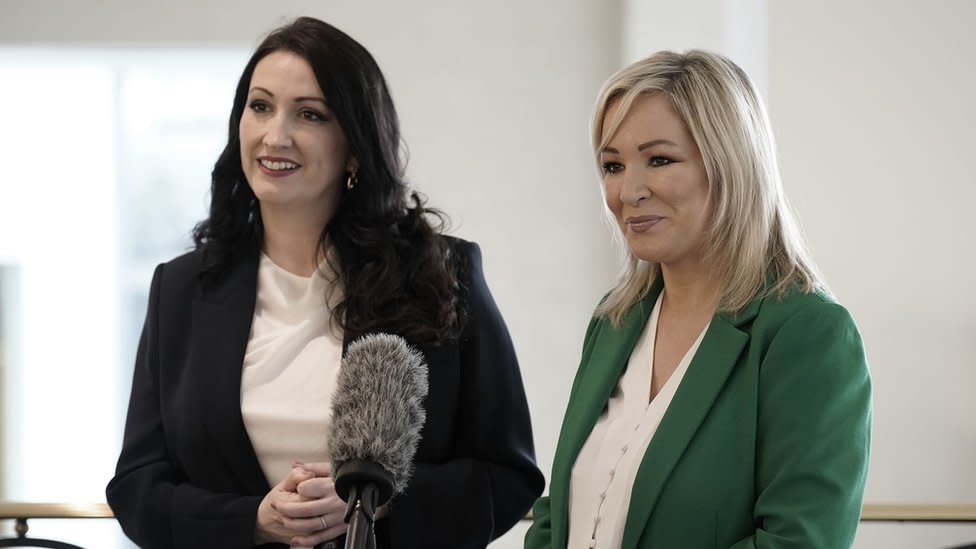Casement Park: Gordon Lyons seeks 'clarity' on cash from UK government
Northern Ireland's sports minister has said he is still awaiting clarity from the UK government on how much funding it will contribute towards redeveloping Casement Park.
Gordon Lyons said uncertainty over funding streams was acting as a "blockage" to the west Belfast stadium redevelopment.
The stadium is due to be used in the UK and Ireland's hosting of Euro 2028.
But costs have escalated to beyond the initial estimate of £77.5m.
The Stormont Executive previously pledged £62.5m, with the Gaelic Athletic Association (GAA) committing £15m to the project.
It has been suggested by Democratic Unionist Party (DUP) MP Jim Shannon that the overall cost could be £220m, while Westminster sources have indicated it could now be as much as £300m.
In February, the Irish government said it would provide €50m (£42.8m).
Northern Ireland Secretary Chris Heaton-Harris previously expressed confidence the funding would be found for Casement Park.
But in a letter to the Department for Communities earlier this year, he said the government would "not accept a position where it is expected to cover the scale of funding gap there appears to exist".
Mr Lyons told the Stormont Assembly's communities scrutiny committee that the executive's previous funding allocation for Casement remained in place.
The communities minister said he was still seeking clarity on how the funding shortfall would be met.
"The department is now the contracting authority for Casement, but we're not able to go any further in terms of procurement until we have clarity on where the funding is coming from," he told assembly members.
Mr Lyons was asked by Alliance Party assembly member Sian Mulholland where the "blockage" was in progressing a tendering process for the stadium project.
The minister responded: "The blockage is getting clarity from the funding partners including the UK government on how much they are prepared to contribute to what will be the overall cost.
"That's what we are waiting on. I have asked the UK government for clarity on that. I believe that discussions are ongoing, but I haven't had any response to that yet."
Finance talks
Meanwhile the first and deputy first ministers have asked to meet Prime Minister Rishi Sunak to talk about Stormont's finances.
Stormont ministers are currently in the process of setting a budget for the financial year.
But on Wednesday, finance officials warned that ministers needed £2bn more than the amount of funding that is available.
First Minister Michelle O'Neill said transforming public services required more investment.
She was speaking after meeting Mr Heaton-Harris with Deputy First Minister Emma Little-Pengelly.
Ms O'Neill said no department would be "happy" with what funding is allocated to it.

"From day one, our priority has been to secure a proper funding model and we're not there yet," she said.
"We are in a very difficult position and it's going to be very, very challenging across public services in general.
"We want to do transformation, we want to deliver better services, but we need investment upfront in which to do that too."
Ms O'Neill said she was "not giving up", while the Deputy First minister said the executive was "up for making hard decisions".
"We can only do that by working with the UK Government in terms of getting enough quality investment, and ensuring that public services can continue to operate," added Ms Little-Pengelly.
The UK Government provided a funding package of £3.3bn to the executive as part of a deal that restored devolution in February.
But it came with certain conditions including asking the executive to commit to revenue raising of £113m over the next two years. Ministers have so far resisted that call.
GAA president Jarlath Burns on Wednesday called for the remaining funding gap for Casement Park to be filled by the UK government, saying it had a "moral obligation" to support the GAA "given what has happened in the past".
He said there had never been reparations for Bloody Sunday in 1920, when British forces opened fire on a crowd attending a Gaelic football match in Croke Park, killing 14 people.
"Money would never change that," he told BBC Radio Ulster's Talkback programme.
"But the British government could send a signal to the GAA to say: 'We aren't against you, we understand the role you play in communities and we are going to do this for you.'
"The past is a very sad story, our interactions with the British government. But the Northern Ireland soccer team playing in west Belfast in a GAA ground is a story I want to launch."
Mr Burns later said he expected "welcome news" in the next week on the stadium's redevelopment.
